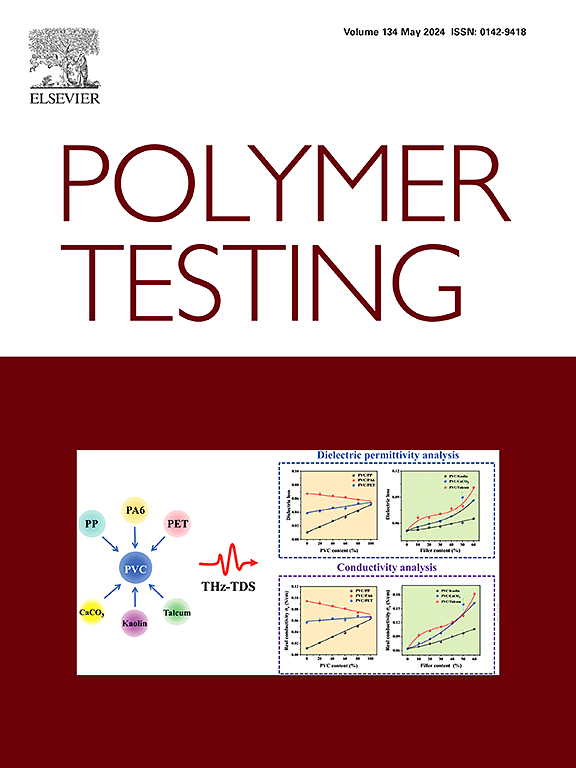Efficient recycling of anhydride-cured epoxy resins for electrical insulation: Green economy and tunable performance
IF 5
2区 材料科学
Q1 MATERIALS SCIENCE, CHARACTERIZATION & TESTING
引用次数: 0
Abstract
The accumulation of resin-based electrical waste poses significant resource wastage and environmental challenges, with chemical recycling representing a key solution. This study innovatively developed a graded alcoholysis-hydrolysis reaction strategy, enabling both the efficient degradation of anhydride-cured epoxy resin within 1 h under mild conditions and the subsequent reuse of the degradation products in regeneration of new epoxy resins. Central to this work is a uniquely designed benzyl alcohol/K3PO4 recycling system, which enables the closed-loop utilization of not only the epoxy resin but also the system itself, owing to the facile separation of its components. Specifically, the average recovery rates of benzyl alcohol and K3PO4 can reach 80.38 % and 90.95 % over 10 cycles, while the recycling system constructed after 10 cycles using them retained over 80 % of degradation efficiency. Furthermore, the study systematically investigated the synthesis of new epoxy resins by adjusting the proportion of recycled resin. As the recycled resin content increased, the insulation performance of the regenerated resin improved, whereas its mechanical strength and thermal stability exhibited a decline. When the recycled resin content reached 30 wt%, the breakdown strength of the regenerated resin increased by 13.5 % compared to the pristine resin, while maintaining a flexural stress of 72.87 MPa and a glass transition temperature exceeding 100 °C. This research provides innovative insights and a theoretical foundation for advancing green decommissioning technologies for resin-based electrical equipment.
电绝缘用酸酐固化环氧树脂的高效回收:绿色经济和可调性能
树脂基电气废物的积累带来了巨大的资源浪费和环境挑战,化学回收是一个关键的解决方案。本研究创新性地开发了分级醇解-水解反应策略,使酸酐固化环氧树脂在温和条件下1小时内有效降解,降解产物随后可用于再生新环氧树脂。这项工作的核心是一个独特设计的苯甲醇/K3PO4回收系统,由于其组分易于分离,该系统不仅可以闭环利用环氧树脂,还可以闭环利用系统本身。其中,10次循环后,苯甲醇和K3PO4的平均回收率可达80.38%和90.95%,10次循环后构建的回收体系降解效率保持在80%以上。在此基础上,系统地研究了通过调整再生树脂的比例来合成新型环氧树脂的方法。随着再生树脂含量的增加,再生树脂的保温性能有所提高,而其机械强度和热稳定性则有所下降。当再生树脂含量达到30 wt%时,再生树脂的击穿强度比原始树脂提高了13.5%,同时保持了72.87 MPa的弯曲应力和超过100℃的玻璃化转变温度。该研究为推进树脂基电气设备的绿色退役技术提供了创新的见解和理论基础。
本文章由计算机程序翻译,如有差异,请以英文原文为准。
求助全文
约1分钟内获得全文
求助全文
来源期刊

Polymer Testing
工程技术-材料科学:表征与测试
CiteScore
10.70
自引率
5.90%
发文量
328
审稿时长
44 days
期刊介绍:
Polymer Testing focuses on the testing, analysis and characterization of polymer materials, including both synthetic and natural or biobased polymers. Novel testing methods and the testing of novel polymeric materials in bulk, solution and dispersion is covered. In addition, we welcome the submission of the testing of polymeric materials for a wide range of applications and industrial products as well as nanoscale characterization.
The scope includes but is not limited to the following main topics:
Novel testing methods and Chemical analysis
• mechanical, thermal, electrical, chemical, imaging, spectroscopy, scattering and rheology
Physical properties and behaviour of novel polymer systems
• nanoscale properties, morphology, transport properties
Degradation and recycling of polymeric materials when combined with novel testing or characterization methods
• degradation, biodegradation, ageing and fire retardancy
Modelling and Simulation work will be only considered when it is linked to new or previously published experimental results.
 求助内容:
求助内容: 应助结果提醒方式:
应助结果提醒方式:


